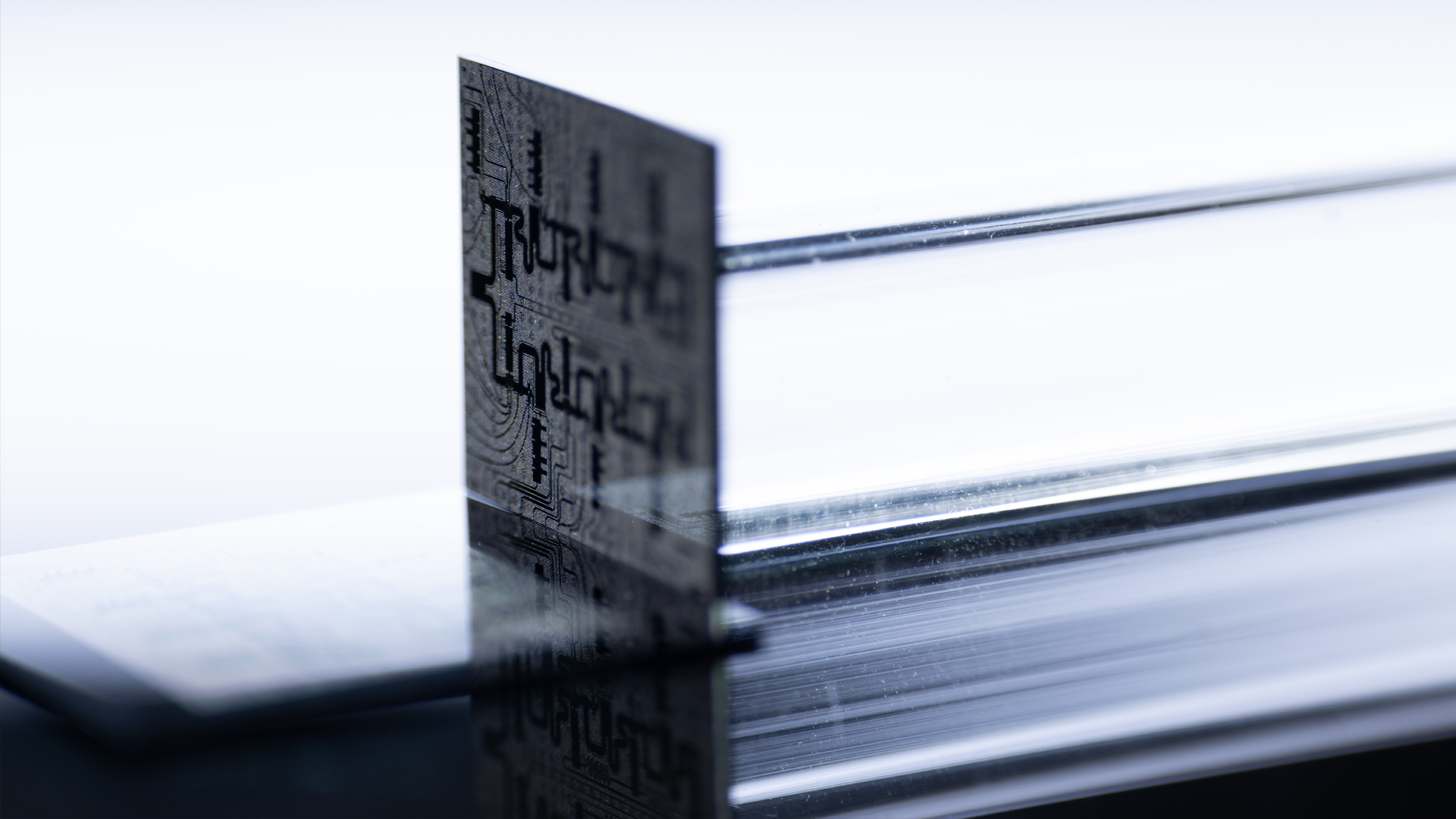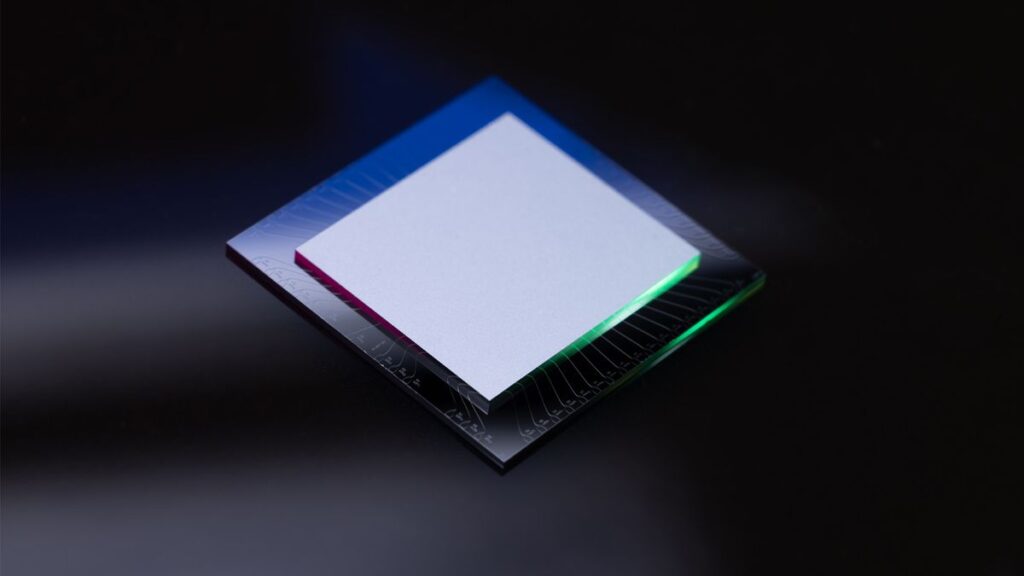Amazon Web Services (AWS) has launched a prototype quantum computing chip that is the first in the world to be fitted with error-resistant “cat qubits” — basic units of quantum computing information inspired by the famous Schrödinger’s cat thought experiment.
The quantum processing unit (QPU), named “Ocelot,” includes five data qubits, or cat qubits, to store information; five buffer circuits made from the superconductor tantalum to stabilize the cat qubits; and four additional qubits to detect errors that occur during data processing.
These internal components are divided across two integrated silicon microchips that each measure roughly 0.16 square inches (1 square centimeter), making the device small enough to fit on the tip of your finger.
The new architecture is designed to significantly reduce the cost and energy needed to slash errors that occur naturally in quantum computers — a challenge scientists are still trying to find a solution to (with progress made in a February 2024 study and another in April last year, among others).
Significantly, the researchers said the new technology could exponentially reduce errors as more qubits are added to future versions of the chip. They outlined their findings in a new study published Feb. 26 in the journal Nature.
Turning down the quantum noise
Because qubits are inherently “noisy” — meaning they’re sensitive to disturbances from vibrations, heat, electromagnetic interference and radiation from space — they are far more prone to failing than classic bits. The error rate in classic bits is 1 in 1 million million, versus roughly 1 in 1,000 in qubits. This far higher error rate often leads to the collapse of any quantum superposition mid-calculation and failures when quantum computations are being performed.
The two types of error are bit-flip errors, where the probability of measuring 0 becomes the probability of measuring 1; and phase-flip errors, where a qubit rotates 180 degrees on its vertical axis. Bit-flip errors affect both bits and qubits, while phase-flip errors affect only qubits. The need to correct both types of error in quantum systems requires significant resources compared with error correction in classical computing.
Related: Google ‘Willow’ quantum chip has solved a problem the best supercomputer would have taken a quadrillion times the age of the universe to crack
Because of this, scientists say that a quantum computer would need millions of qubits before getting close to achieving “quantum supremacy” — which would be unfeasible in terms of the physical space, energy and resources required to build and run such a hypothetical machine. This is why more research is focused on building reliable qubits integrated with error correction technologies.
“Logical qubits” — which are made up of multiple physical qubits that store the same information to spread the points of failure — are the prevailing error-correction method. AWS researchers, however, say that without further improvements to the hardware, current approaches come at a huge and prohibitive cost, because they would need thousands of physical qubits to form one logical qubit capable of achieving low error rates.
Ocelot, however, adopts the cat qubit design developed by the French startup Alice & Bob. Named after the famous Schrödinger’s cat thought experiment, this qubit is designed in such a way that it is inherently resistant to bit-flip errors.
Tapping into new ‘cat qubits’
Unlike the conventional superconducting qubits used in machines built by the likes of IBM and Google that can achieve a superposition of 1 and 0, cat qubits can achieve a double superposition of two quantum states simultaneously. Alice & Bob scientists outlined how this technology works in a roadmap and white paper published in 2024.
The cat qubit uses a quantum superposition of classical-like states of well-defined amplitude and phase to encode information. It uses bosonic particles specifically to encode data — in this case, photons, or particles of light.
The more energy is pumped into the system, the more photons are created, and the more amplitudes, or oscillator states, can be accessed, which better protects quantum information. Increasing the number of photons in the oscillator can make the rate of bit-flip errors exponentially smaller, the scientists said. This means that, to reduce the error rate, you don’t need to increase the qubit count; rather, you need to increase the energy of the oscillator.
Previous experiments over the last decade have shown the potential of cat qubits in single-qubit demonstrations, including a study from a different team in 2015 and one as recently as May 2024. A study published in January this year also outlined an approach to error correction that was inspired by Schrödinger’s cat. However, AWS’s Ocelot is the first example of a coherent multi-cat qubit system integrated into a chip built using existing fabrication methods.

In the new study, the scientists demonstrated measurements taken with Ocelot that show bit-flip errors are exponentially suppressed at the physical qubit level, while phase-flip errors are corrected using the simplest error-correcting code, known as repetition code. The gates between the cat qubits and error-correcting qubits are also effective at detecting phase-flip errors, while preserving the power of the cat qubits to protect against bit-flip errors.
The results showed bit-flip times approaching 1 second — roughly 1,000 times longer than the lifetime of conventional superconducting qubits. This was accomplished using four photons, enabling phase-flip times measured in tens of microseconds, which is sufficient for quantum error correction.
The scientists then tested the system to determine how effective this architecture could be at behaving like a logical qubit. The total logical error rate was 1.72% when running code on three cat qubits, versus 1.65% when using five cat qubits. With nine qubits in total (five cat and four error-correcting), they hit error rates comparable to a system with 49 physical qubits.
Scalable quantum computing
The scientists estimate that using the architecture in Ocelot, a future quantum computer with “transformative societal impact” needs as little as one-tenth of the resources that would otherwise be needed with standard approaches to quantum error-correction.
“Future versions of Ocelot are being developed that will exponentially drive down logical error rates, enabled by both an improvement in component performance and an increase in code distance,” co-authors of the study, Fernando Brandão, a Caltech professor of theoretical physics, and Oskar Painter, professor of applied physics at Caltech, said in a technical blog post. “Codes tailored to biased noise, such as the repetition code used in Ocelot, can significantly reduce the number of physical qubits required,” they said.
“We believe that Ocelot’s architecture, with its hardware-efficient approach to error correction, positions us well to tackle the next phase of quantum computing: learning how to scale,” Brandão and Painter added. “Scaling using a hardware-efficient approach will allow us to achieve more quickly and cost-effectively an error-corrected quantum computer that benefits society.”
